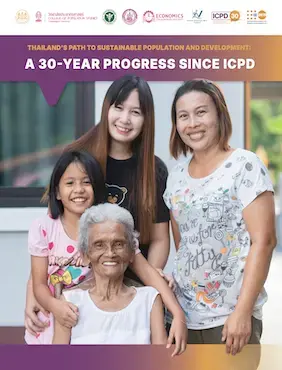Thirty years after the 1994 ICPD Programme of Action, Thailand remains committed to its goals, which are increasingly important in addressing contemporary population development challenges. As one of 179 Member States that adopted the ICPD PoA, Thailand recognizes reproductive rights as fundamental human rights and has consistently worked to empower all population groups. This report provides a detailed account of Thailand’s progress since the 2019 Nairobi Summit, focusing on key achievements, as well as the country’s approach to population and development challenges.
Thailand has experienced profound demographic changes. Fertility rates have declined significantly, driven by changing cultural norms, economic and social pressures such as underemployment, gender inequality, and reproductive health challenges. Thailand had also entered the completely aged society stage. These demographic changes come with both challenges and opportunities. Ensuring long-term demographic resilience remains a priority, both via enabling individuals and families to achieve their desired family sizes, and through supporting silver economy.
Universal access to reproductive health services is integrated into Thailand's healthcare system. While family planning and adolescent health services have seen marked success, vulnerable groups, particularly ethnic minorities and those in remote areas, continue to face barriers to access. Targeted interventions to overcome these disparities are ongoing.
Thailand has made notable strides in gender equality, becoming the first Southeast Asian nation to pass marriage equality legislation. However, persistent social norms and entrenched gender roles continue to limit progress, particularly in addressing gender-based violence and increasing women's participation in decision-making processes. Technology and innovation platforms are at the forefront of connecting vulnerable population groups with necessary government services to bridge inequality and assistance gaps.
Human capital development remains central to Thailand’s policy agenda. Despite significant advancements in education and healthcare, structural inequalities persist. Upskilling and lifelong learning opportunities, particularly for older adults, migrants, persons with disabilities, and women re-entering the workforce, are crucial to fostering a more inclusive and productive labour market.
In data management, Thailand is at the forefront of demographic data modernization. Digital innovations, such as online self-enumeration in census-taking, are enhancing data collection efforts, although challenges related to the digital divide and data protection remain, along with the need for continues data disaggregation.
Thailand’s unwavering commitment to the ICPD PoA is evident in its strategic focus on demographic resilience, social inclusion, and sustainable development. Looking ahead, addressing the needs of vulnerable groups, advancing gender equality, and ensuring equitable access to resources will remain central to Thailand’s efforts to build a sustainable, prosperous future for all.
|
See Policy Brief here: File
|
|
Share this page with this QR Code:
|






